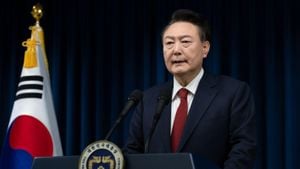South Korean President Yoon Suk Yeol is facing tremendous political turmoil as he defiantly defended his controversial declaration of martial law during a nationally televised address. This declaration was made amid accusations of poor governance and allegations of election fraud from the opposition, as his own party members increasingly call for his impeachment.
During his address, delivered on December 12, 2024, Yoon painted his martial law decree as necessary for safeguarding democracy, asserting it was meant to counteract what he labeled as “anti-state forces.” He claimed the opposition party, the Democratic Party, was actively working to undermine state affairs and, by extension, the well-being of the nation. Specifically, he cited North Korean hacking threats as justification for his actions, insisting the integrity of the National Election Commission had been compromised.
“I will fight to the end,” Yoon declared to his supporters, attempting to rally public sentiment against his opponents. He accused them of engaging in what he called political theater aimed purely at creating chaos and impeding government functions. "The major opposition party is engaging in a frenzied dance with swords, claiming martial law is treason,” he stated, questioning the rationale behind their arguments.
These remarks come as the clock ticks down to another parliamentary vote on whether to impeach him. His political security is tenuous; the People Power Party (PPP), which has largely backed him until now, is split. A notable number of lawmakers have signaled their intent to support impeachment, creating significant pressure as calls for his resignation continue to grow louder.
Yoon’s martial law order, which was described as both abrupt and controversial, has unleashed waves of unrest across the country. Public sentiment against him has been heating up, with protests erupting from various sectors demanding accountability. For many South Koreans, the declaration of martial law revived painful memories of past authoritarian rule and state censorship.
The immediate aftermath saw protests organized by activist groups, rallying against perceived oppression and governmental overreach. Demonstrators have vocally criticized Yoon’s approach, likening his government’s reactions to dissent as reminiscent of dictatorial regimes. The impassioned speeches and slogans during these rallies reflect intense dissatisfaction among citizens, especially the youth, many of whom were not alive during previous military governments.
Adding to the turmoil, Yoon himself is under criminal investigation for insurrection pertaining to the martial law declaration, raising the stakes dramatically. His administration's measures to clamp down on dissent have led to numerous arrests and investigations, casting doubt on the legitimacy of his leadership.
The upcoming parliamentary impeachment vote is pivotal. The opposition needs the support of only eight members from Yoon's PPP to pass the motion. Given the increasing number of defections and the apparent loss of support among his ranks, it remains to be seen whether Yoon can muster enough loyalty to stave off removal from office.
Prior to the vote, PPP chief Han Dong-hoon openly stated the necessity of impeaching Yoon, reinforcing the party’s growing chasm. "We just saw the president delivering a speech intolerable from a democratic perspective," Han asserted, signaling the divide within the party. Yet some PPP members continue to waver, indicating their support for Yoon remains steadfast, at least for the moment.
Since Yoon’s accidental imposition of martial law on December 3, 2024, public and political backlash has only intensified. His claim linking the martial law to voter fraud from North Korean interference portrays a government deeply entrenched in its struggle against perceived external threats, but many view these justifications as thinly veiled attempts to consolidate power.
“Viewing emergency measures to save the country as acts of treason puts our constitution and legal system at risk,” Yoon argued, presenting his martial law as necessary for national stability. Yet, his framing of the opposition and societal unrest has not quelled public agitation; rather, it has catalyzed protests and demands for accountability.
With political observers noting the precariousness of Yoon’s presidency, both sides continue to clash as the vote approaches. Will Yoon succeed in steering through this political storm, or will he be ousted as dissent swells against him? This pivotal moment could shape the future of South Korean governance and the democratic processes within the nation.
The contrasting narratives surrounding Yoon’s administration reflect broader themes of democracy, governance, and the enduring shadows of South Korea's tumultuous political past. Each impending development can alter not just the political fabric of the nation but could also define the public’s relationship with its government for years to come.
Protests are anticipated to happen consistently leading up to the impeachment vote, encapsulating the growing divide among South Korean citizens. For many, the stakes are high as they seek to reclaim their democratic freedoms from the grip of what they perceive as overreach by their ruling leaders.
So, as President Yoon Suk Yeol continues to articulate his vision of stability through martial law, citizens and political analysts alike watch closely, wondering what the future holds for South Korea's democracy.
The upcoming weekend may well determine not only his presidency but also depict how South Korean political dynamics adapt to the challenges of today. Will the voice of the people rise above political maneuvers, or will the tides of history repeat themselves?



